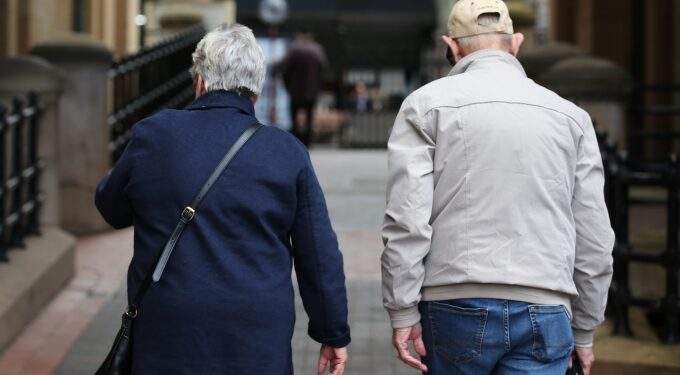Anne (not her real name) only realized the extent of her older brother’s abuses against their elderly mother after he had taken her away.
According to Anne, her brother had been secretly claiming carer’s allowance and other benefits, and allegedly forging their mother’s signature to alter her will.
“When I got the NCAT ruling, which determined that my mother still had the capacity to manage her own affairs, he had spent most of her money on gambling and alcohol,” she recounted the heartbreaking story to The Guardian in 2018.
“He then left her to die of neglect. The doctors told me she had not had her medication in over two weeks and was suffering from malnutrition.”
Anne’s ordeal reflects a growing pattern of elder financial abuse in Australia that has been often described as “inheritance impatience.”
 |
|
Elderly people walk down a street in Sydney, Thursday, August 24, 2023. Photo by AAPIMAGE via Reuters |
According to the Australian Financial Review, baby boomers, the nation’s wealthiest generation, together with the preceding Silent generation, are expected to transfer around A$5.4 trillion (US$3.56 trillion) to younger generations over the next two decades.
While inheritances are not officially tracked, wealth manager JBWere estimated last year that the average inheritance for Australians was A$706,806 at age 55.
But many younger Australians are unwilling to wait that long for their inheritance and turning to extreme measures to claim it while their elders are still alive, as reported by CHOICE, a publication by the non-profit consumer advocacy group of the same name in Australia.
In many cases, abuse begins when a child is granted power of attorney over a parent’s finances and uses that authority to take assets for themselves. Others pressure elderly parents to rewrite wills in their favor or gain control of the family home to prevent its sale, even when their parents need the proceeds for aged care.
Research has also uncovered cases where grandparents were coerced into handing over property deeds with threats of not getting contact with their grandchildren. In other situations, retirement funds were emptied after adult children were appointed as trustees of pension funds.
A government report released in 2021 found that roughly 83,000 Australians aged 65 and above were victims of financial abuse in the preceding year. Psychological abuse was even more widespread, affecting about 471,300 older people, while neglect was reported among 115,500.
The issue has likely worsened since then as soaring living costs place greater strain on families across the country.
While inflation has eased from its December 2022 peak of 7.8% to 2.1% in the year to June, the biggest inflation shock in decades has left Australia far costlier than before the pandemic.
The latest Australian Bureau of Statistics Consumer Price Index showed that food and non-alcoholic beverages grew 3% in the 12 months to July 2025, while fruit and vegetables were up 4.8%, as cited by the Australian Broadcasting Company.
“We think it just adds up to a real massive cost of living crisis for Australians,” said Mark Serrels, CHOICE’s editorial director.
Home prices have also been outpacing wages, leaving younger generations increasingly locked out of the housing market.
According to data from the Ageing and Disability Commission (ADC), which runs a hotline for reporting abuse of older people and adults with disabilities, cases involving seniors have doubled since the agency was set up in 2019. It recorded 365 allegations of financial exploitation between July and September of last year.
“We are [at] the start of the largest intergenerational transfer of wealth … there’s increased risks around cost-of-living pressures, housing pressures that all feed into and enhance [risk of elder abuse],” Kathryn McKenzie, then acting Commissioner at ADC, told Law Society Journal earlier this year.
Mary Lovelock, senior solicitor at Legal Aid NSW’s Elder Abuse Service, says money and housing disputes make up a large share of the cases handled by her service.
Many older clients trust their families completely, often telling her, “[I] don’t need to see a lawyer, my family will always do the right thing by me.”
“And sadly, what we see is that doesn’t happen a lot of the time,” she said.
One such case is that of a retired Australian nurse, known by the alias Joan. Having long dreamed of stability after years of renting, she entrusted her pension savings of more than A$70,000 to a family member to fund a small apartment in their backyard.
What followed was far from the retirement she had imagined. Within a year, the unit stood incomplete and without a kitchen or working laundry, forcing Joan to depend on the main house. Her relationship with the relative deteriorated and the arrangement collapsed.
“I was told to get up and pack up and get out of there,” Joan told Bloomberg through a lawyer. Deprived of her savings and assets, she was left without a pension, a home, or any form of security.
As cases like Joan’s make headlines, awareness has grown and prompted efforts from government agencies and across sectors to tackle the issue.
Banks and financial advisers are now being trained to recognize warning signs of potential exploitation, such as sudden large withdrawals or unusual money transfers. At the same time, the Age Discrimination Commissioner last year partnered with the Attorney-General’s Department to establish a Financial Elder Abuse Action Collaborative, which brings together banks, financial service providers and community organizations to coordinate efforts to prevent and respond more effectively to elder financial abuse.
McKenzie says part of the solution also lies in changing seniors’ attitudes. Seeking legal advice, she notes, should not be viewed as a sign of mistrust but as a sensible safeguard.
“Things will often go wrong … relationships are complex and often change,” she says.
For Joan, it was only after being evicted that she realized she had been a victim of abuse. Legal support helped her reclaim much of her money and secure emergency housing, though the emotional pain still lingers.
“I’m not good at the moment,” she said. “I am going to get counseling.”





